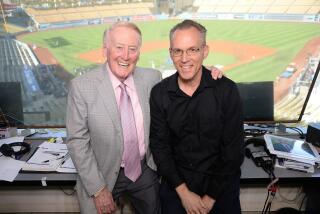Strawberry Faces Another Hurdle
- Share via
Tears welled up in Darryl Strawberry’s eyes and for a moment he had to stop to wipe them away and compose himself. There was no shame in that, not for a 36-year-old man facing cancer surgery.
At that poignant moment, the human side of Strawberry was out there, displayed for all the world to see. It was an emotional, sad peek into the soul of a star, a moment when Strawberry was just another guy, trying to summon the courage to face the biggest challenge of his life.
Too often, athletes are viewed as some kind of special species, immune from the daily grind that the rest of the population faces. They are celebrated, hailed really, because they are blessed with special skills and talents others envy.
Then, every so often, something bad happens, something that leaves them vulnerable, just like everybody else. People forget that athletes are subject to the fragile balance of life. That overlooked element gets lost in the cheers and is found again at times of travail.
Strawberry found that balance in his diagnosis -- colon cancer.
He has been down this path before, too often, in fact. There were alcohol and drug problems, followed by tax troubles, much of it grief he brought upon himself.
There was back surgery at what should have been the most productive time of his career. There was enough baggage that no team was interested in a guy who had become a baseball vagabond after once being one of the game’s most feared sluggers. Whole seasons went up in smoke, erased by choice or chance.
Strawberry seemed used up early, assigned to baseball’s scrap heap, playing for peanuts with the St. Paul Saints in the Northern League, an independent operation that functions as a court of last resort.
To his credit, he pressed on, convinced that he could still play. Eventually, the New York Yankees agreed. On July 4, 1996, owner George Steinbrenner gave himself a birthday present and signed Strawberry as a spare part on a Yankees team that would win the World Series.
He became what manager Joe Torre calls “the Straw Factor” a sort of folk hero in the Bronx, remembered for his first baseball incarnation as a teen-age slugger with the New York Mets, welcomed back in the twilight of his career as an old friend who had overcome some hard times.
He was limited to 11 games last year because of a cranky knee but refused to go away, fighting through it to win a spot on this year’s team.
Strawberry seemed reborn in Yankee Stadium, a senior statesman on the team who still could swing a productive bat. He hit 24 home runs in 295 at-bats this season, despite a persistent pain in his stomach.
Everybody has gone through that experience, a twinge here, an ache there, something that will eventually go away.
This pain didn’t go away.
Cleveland pitcher Dwight Gooden, an old pal from their days together, first with the Mets and then with the Yankees, recalled a midsummer conversation with Strawberry.
“When we saw him the last time we were here,” Gooden said, “he mentioned about having some pain in his stomach and he wanted to get checked out, but he wasn’t sure he could get through it.”
Strawberry knew this was no ordinary baseball injury, no simple sprain or strain. And like so many people, he tried to put it out of his mind.
When the pain and worry became too much, he decided to find out once and for all just what was wrong.
Cancer.
The Yankees stitched Strawberry’s No. 39 on the back of their caps. In San Diego, ex-teammate Jim Leyritz put the number of his cap. Bartolo Colon of the Indians did the same.
It was baseball reaching out to one of its own. Perhaps Gooden put it best.
“I met Darryl in ‘83,” he said. “We became very close after that, especially the time we spent with the Mets, and you care more for a guy off the field than you do on the field because baseball is going to be here. We have to live our life after that. So any time you see a good friend like that go through something like that, it is very touching and you feel for that person.”
Within days of his diagnosis, Strawberry had surgery, a long, complicated operation that removed the tumor and part of his large intestine.
And hours before the operation, Darryl Strawberry cried, tears for himself and his family, tears for all the troubled times he had put himself through before, and tears for all the difficult ones he faces now.
More to Read
Go beyond the scoreboard
Get the latest on L.A.'s teams in the daily Sports Report newsletter.
You may occasionally receive promotional content from the Los Angeles Times.










